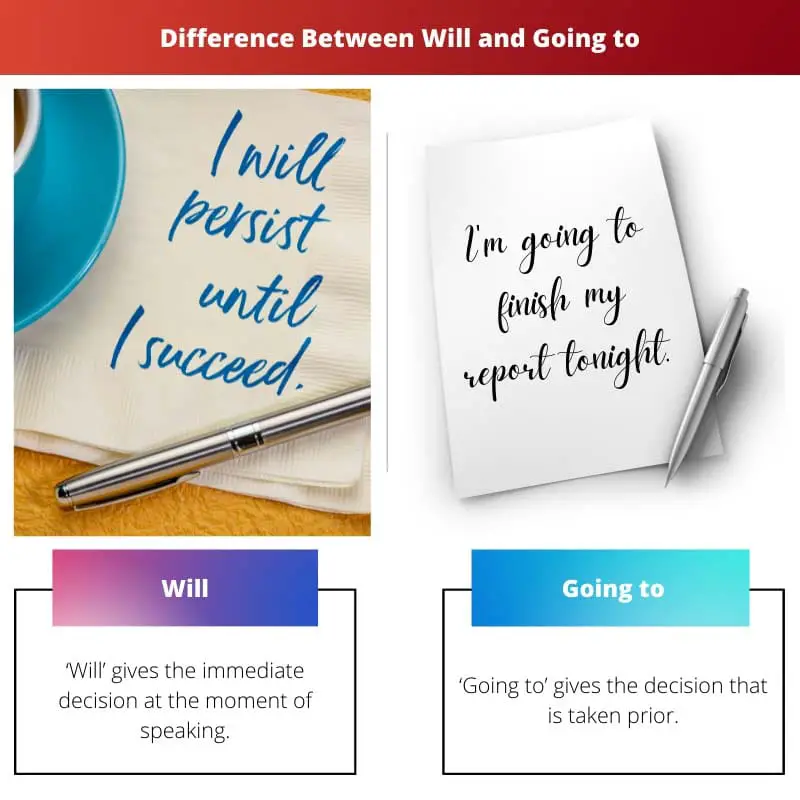“Will” is used for spontaneous decisions or predictions about the future, emphasizing immediacy and certainty. On the other hand, “going to” is employed for planned or premeditated actions, highlighting intention or expectation based on present evidence or circumstances. The choice between them depends on the speaker’s perspective on the level of certainty or intentionality involved in the future event.
Key Takeaways
- “Will” expresses a future action or intention, while “going to” indicates a planned or predetermined event.
- “Will” implies a spontaneous decision or prediction, whereas “going to” suggests a prior plan or intention.
- Both forms can describe future events, but “will” has a more general usage, and “going to” is for specific, intended actions.
Will vs Going to
Will and going to are frequently used in informal conversations. They can be used interchangeably. will is more frequently utilized with recent decisions, specific futures, and predictions if you want to be as accurate as you can. Going to is frequently used about predetermine events. Will is utilized for recent, quick judgements and when speaking with assurance about the future. Going to is a phrase used to describe pre-planned events.

Comparison Table
| Feature | Will | Going To |
|---|---|---|
| Meaning | Refers to the future | Refers to the future |
| Planned vs. Unplanned | Typically unplanned or spontaneous decisions | Typically planned decisions made in advance |
| Predictions | Based on personal feelings, opinions, or general truths | Based on evidence or clear intentions |
| Examples | * “I will help you with your homework.” (Spontaneous offer) * “The sun will rise tomorrow.” (General truth) * “I think it will rain today.” (Prediction based on feeling) | * “I am going to visit my family next week.” (Planned visit) * “She is going to be a doctor.” (Based on her current path) * “Look at those dark clouds! It is going to rain.” (Prediction based on evidence) |
When to Use Will?
1. Future Predictions:
- Usage: “Will” is frequently used when making predictions about future events or outcomes without prior planning or intention.
- Example: “I think it will rain tomorrow.”
- Explanation: In this sentence, “will” indicates a forecast or prediction about the weather, emphasizing uncertainty and lack of control over the event.
2. Spontaneous Decisions:
- Usage: “Will” is employed when deciding on actions or making commitments spontaneously at the moment of speaking.
- Example: “I forgot to buy milk; I will go to the store now.”
- Explanation: Here, “will” reflects an immediate decision made in the present moment, showing a lack of prior planning or intention.
3. Offers and Promises:
- Usage: “Will” is used for offering assistance, making promises, or expressing willingness to do something.
- Example: “Don’t worry; I will help you with your project.”
- Explanation: In this context, “will” denotes a commitment or assurance of future action, conveying the speaker’s intention to provide assistance or support.

When to Use Going to?
1. Planned Actions:
- Usage: “Going to” is utilized to discuss future events or actions that have been premeditated or planned in advance.
- Example: “I am going to visit my grandparents next weekend.”
- Explanation: Here, “going to” suggests a deliberate intention or arrangement to visit grandparents, implying prior consideration or planning.
2. Future Intentions Based on Evidence:
- Usage: “Going to” is employed when there is present evidence or observable circumstances supporting future intentions or outcomes.
- Example: “Look at those dark clouds; it’s going to rain soon.”
- Explanation: In this instance, “going to” is used to forecast a future event based on the current observation of dark clouds, indicating a high probability of rain.
3. Predictions with Evidence:
- Usage: “Going to” is used when making predictions about future events based on observable facts or evidence.
- Example: “She’s been studying all night; she’s going to ace the exam.”
- Explanation: Here, “going to” suggests a strong likelihood of success in the exam, supported by the observable fact that she has been studying diligently.

Main Differences Between Will and Going to
- Will:
- Typically used for spontaneous decisions or predictions.
- Emphasizes immediacy and certainty.
- Often employed for offers, promises, or future events without prior planning.
- Going to:
- Used for planned actions or intentions.
- Emphasizes premeditation or arrangements made in advance.
- Based on present evidence or circumstances, indicating a strong likelihood of the future event occurring.




